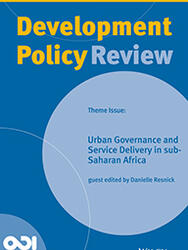Journal Special Issue
Urban Governance and Service Delivery in sub-Saharan Africa
This special issue comprises UNU-WIDER research focusing on key governance challenges related to addressing gaps in urban service delivery in sub-Saharan Africa. First, due to decentralisation policies in much of Africa, the provision of services is often transferred to sub-national authorities. But complex layers of administration and high levels of poverty deprive local governments of adequate resources. Secondly, opposition parties now control a number of African cities, a situation known as ‘vertically-divided authority’. Consequently, central governments do not always have an incentive to help municipal governments improve their performance. Case studies of Senegal, South Africa, and Uganda highlight how and when such dynamics become problematic for the delivery of urban services, and offer important implications for the donor community.
 Join the network
Join the network